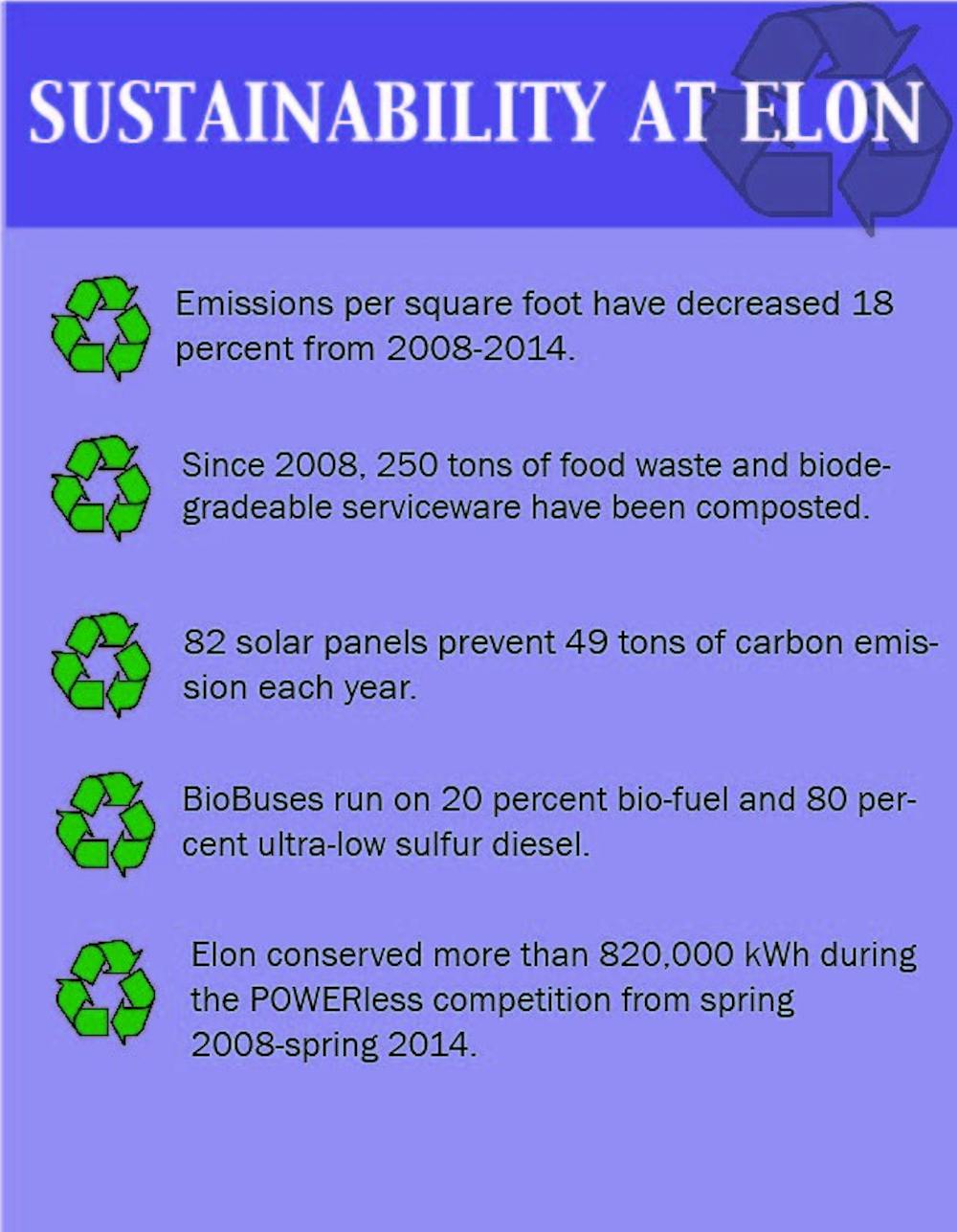The BioBus, water bottle refill stations and composting options are just a few of the sustainable efforts Elon University has implemented to make the campus more eco-friendly, but students don’t always take advantage of them.
The Office of Sustainability has been hard at work making Elon more eco-friendly since the Environmental Advisory Council (EAC) created the Sustainability Master Plan in 2006.
Currently, Elon has 19 Leadership in Energy and Environmental Design (LEED)-certified structures. According to the U.S. Green Building Council, LEED buildings save money and resources, have a positive impact on the health of occupants and promote renewable, clean energy.
Elon has three neighborhoods — The Station at Mill Point, Colonnades and The Loy Center — that contain LEED-certified buildings. The Global Neighborhood is currently LEED-registered, meaning it is in the process of being certified.
“Elon has a long history of implementing energy and water conservation,” said Elaine Durr, director of sustainability.
Elon’s energy usage per square foot has decreased 28 percent since 2002. During this same period, the square footage of buildings on campus has increased 95 percent and student enrollment has increased 42 percent.
But even in light of these positive statistics, there is a lot more students and faculty can do.
Durr said there are three easy actions students can take.
First, students can take the Sustainability Pledge and look at the Sustainable Living Guide on the Office of Sustainability’s website. The guide includes tips such as using a desk lamp or natural light, rather than overhead lighting, when possible.
A second action is to visit the “Take Action” section of the office’s website for additional ways to promote sustainability, such as calculating carbon footprints, joining the Sierra Club or taking the four-week sustainability challenge, which tracks how much energy individuals use and waste.
Lastly, students can stay connected with the Office of Sustainability through Facebook, Twitter and Instagram.
Students also have the option to team up to be more eco-friendly.
The spring Phoenix Cup seeks to educate participants on overconsumption and engage them in ways to reduce waste. Students and staff can form teams and go through the checklist on the Office of Sustainability’s website to be entered into a drawing for prizes.
“[The Phoenix Cup] is a good way for students, faculty and staff to learn about and participate in waste reduction,” Durr said.
Students can also look to their peers to get involved.
The Eco-Reps Program is made up of students who educate their peers about sustainability issues. One Eco-Rep, sophomore Samantha McCabe, said she enjoys being involved in sustainability because of the impact she can make on others’ choices.
“One of the reasons why I think it is important to educate about sustainability in college is because people can find these strong connecting values that exist between sustainability and their major and other interests,” McCabe said.
Sophomore Devon Johnson, another Eco-Rep, focuses on sharing helpful tips that can make a difference with students. She urges students to take advantage of the BioBus as a way to save money and be eco-friendly.
“The BioBus can take you pretty much anywhere you would want to go, including off-campus residential areas, Alamance Crossing and the co-op,” Johnson said. “And it’s a great alternative to driving, is easy to use and totally free.”
The Eco-Reps raise awareness about sustainability programs on campus through informal conversations. Professors can also request formal lessons for Elon 101 and Global Experience classes.
Students are moving to be more eco-friendly. But there is still a long way to go.
“People tend to think of sustainability as something they can do every now and then, or when people tell you to recycle,” Johnson said. “However, every little decision, purchase and flip of a light switch matters.”


